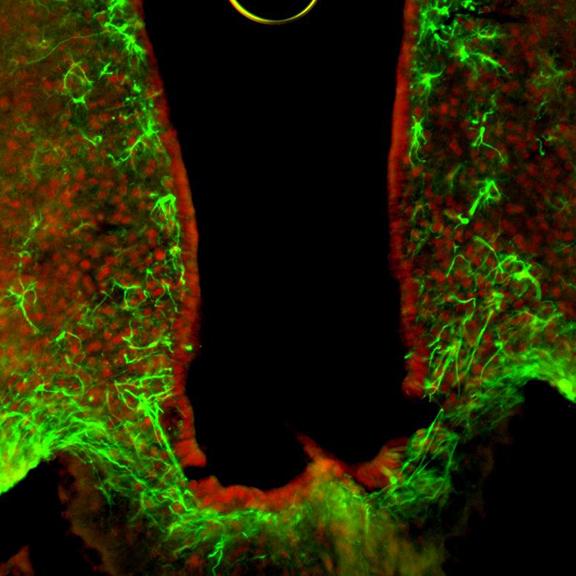
HDAC5 (red) is a key factor in neurons for the control of food intake, astrocytes are stained in green. Why do we get fat and why is it so difficult for so many people to keep off excess weight? Researchers in the Reseach Unit Neurobiology of Diabetes led by Dr. Paul Pfluger and at the Institute for Diabetes and Obesity led by Prof. Dr. Matthias Tschöp have now identified a new component in the complex fine-tuning of body weight and food intake. They found that the enzyme histone deacetylase 5 (HDAC5) has a significant influence on the effect of the hormone leptin*. This hormone plays a crucial role in triggering satiety and thus on how the body adapts to a changing food environment.
Pfluger describes the results as follows: "HDAC5 is an important link in the communication between our fat tissue and hunger centers in the brain." Initial experiments have shown that the production and activity of HDAC5 in our control center for energy balance, the hypothalamus, is increased by a high-fat diet, by enlarged fat deposits and by the satiety hormone leptin. Dhiraj Kabra, first author of the study, added: "HDAC5 is a molecular switch in the brain that helps the body to recognize how full the fat depots are. Without HDAC5, we cannot adapt our food intake or curb our fat deposition."
Disruption of the signaling pathway leads to obesity
According to the scientists, mice unable to produce HDAC5 respond significantly worse to leptin - a condition referred to as leptin resistance. They show a continuously increased food intake and - in comparison to mice with intact HDAC5 - show increased obesity, i.e. they get fat. Through targeted activation of HDAC5 the team was able to reverse this effect, and thereby enabling obese animals to loose fat mass and body weight.
"The restoration of leptin sensitivity is an important step on the path towards sustainable weight loss and towards combating potential sequelae of obesity such as type 2 diabetes," said study leader Pfluger. "In addition to the essential changes in diet and exercise behavior, in the future the individual components of the leptin effect could be potential drug targets to support the weight loss process." One of these essential components - HDAC5 - has already been identified. "However," Pfluger concluded, "it remains to be seen in the coming years whether this enzyme will be a suitable target for combating obesity in humans."
Source: Helmholtz Zentrum München - German Research Center for Environmental Health
 Print Article
Print Article Mail to a Friend
Mail to a Friend
